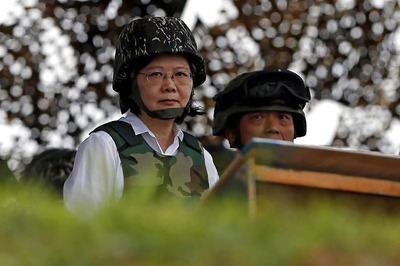
views
No matter how much you detest the idea of Bollywood being trapped in its male-dominated ideologies, the fact remains that for years it hasn’t given much importance to women whether it is onscreen or offscreen. While it is still not uncommon to view women being cast as 'eye candy', masked by dollops of make-up, there have been a few names who have been courageous enough to shed that image.
Female driven films may have become commonplace now with actresses like Vidya Balan, Aishwarya Rai Bachchan, Priyanka Chopra and others shouldering the story. But it was Sridevi, who with her acting prowess, managed to be part of several norm-defying films in 80s and 90s. Not only did she represent women as both independent and confident, but also took up female driven films with real lead characters. She represented women – as a friend, a mother, a wife, a beloved - majority of us will admire for years.
The actress reigned as the queen, co-starred with legends as an equal and to many, she was a beloved star. She was the new hero of Hindi cinema.
Sridevi kicked off her career as child artiste in the Tamil film Thunaivan (1969) and took up numerous offers as a child artiste before she bagged her first major role in K Balachander's film Moondru Mudichu wherein she played Rajinikanth's stepmother. With films like Sigappu Rojakkal and Varumayin Niram Sigappu, she was established as a hit pair opposite Kamal Haasan. She was next seen in a few Malayalam films, including Thulavarsham before Bollywood directors took note of her versatility.
Despite the fact that P Bharatiraaja's Solva Saawan (a remake of his Tamil super hit 16 Vayadhinille) which hit the screens in 1979 failed to make the cash registers ringing at the box office, it was indeed a good omen for better things to come, something Sridevi herself had said in an interview.
Years later, she was featured opposite Jeetendra in Himmatwala (1983) one of the biggest hits of the year that helped Sridevi garner huge fan following. Interestingly, this was also the year that saw the remake of Balu Mahendra's Tamil superhit Sadma. In just her second film as a Bollywood actress, Sridevi broke stereotypes and made it quite clear - women can perform complex yet incredible characters and such movies will always be popular with the viewers.
By essaying the role of a woman who backslides to her childhood following a head trauma, she proved nothing about her performance was typical in the least.
Three years later, Sridevi once again stumped the viewers by taking up a role not many actresses were comfortable performing. This time she was seen doing something new – play Icchadari Nagin in Nagina (1986). Sridevi, who had established herself as a star by mid-1980s, found several takers as a shape-shifting woman in Harmesh Malhotra’s directorial. Such was the impact of her performance in the film that the makers planned a sequel.
ChaalBaaz featuring Sridevi, Sunny Deol and Rajinikanth in key roles, wasn’t just remembered for its plot, but also for strong performances by the cast. She played twins - the compliant Anju and the energetic Manju to perfection. With ChaalBaaz, Sridevi showed the industry she was capable of carrying the entire plot on her own shoulder with a double performance. And proved she was ready to adapt to the requirements of the roles, and not just add the sex appeal to a story. Success could easily be gauged by its box office success and Sridevi winning her first Hindi Filmfare Award for Best Actress.
The box-office success of Chandni in 1989 that marked an upsurge in filmmaker Yash Chopra’s fortunes, also proved that an actress could carry a film as successfully as actors Rishi and Vinod who enjoyed huge star power.
Even though Sridevi played the archetypal heroine, she was the character we followed throughout the film. Chandni broke the monotony of 1980s action-packed period, and gave viewers an opportunity to appreciate a love story which made an impact because this heroine-centered film was unusual for its time. What also worked in the favour of the film was the ideal woman that Chandni was, making Rishi Kapoor and Vinod Khanna instrumental in supporting her journey.
After Chandni, Chopra released Lamhe, the film which is often referred to as Bollywood’s progressive work. The film wasn’t just the story of a young man, Viren’s unrequited love for an older woman (Sridevi), but also the story of Pooja (Sridevi) falling for a man who once loved her mother. While many appreciated the director for coming up with something as daring as this, Sridevi floored fans with her convincing and believable performance.
Another film that gave Sridevi an opportunity to embrace the challenge of putting forth double personalities was Khuda Gawah. The epic action-romance film which was directed by Mukul S Anand with Sridevi in a double role was enough to understand the supremacy she enjoyed as an actress.
After a 20 year hiatus, Sridevi made a comeback in English Vinglish which wasn’t just a female driven film, but about a female protagonist in late 40s. The plot revolved around the problems that women face, and the efforts the lead invests to overcome them without seeking the help of a man. English Vinglish is radical and not the typical Bollywood romances we have grown up watching.
Sridevi surprised us by playing as a middle-aged woman who steps out to prove her family wrong and do something for herself with perfection. She owned the character and encouraged every woman to command the respect she deserves.
Her 300th film Mom that released in 2017 was wronged-mother-seeking-revenge drama. Yes, the actress was back as a vengeful mother. Even though Sridevi’s performance was a bit restrained, it didn’t lack emotional depth. The fact that MOM marked her 50th year in the industry, she had to take up an indelible character that chose to pull from her inner strength and came across as the fearless female lead. In a way, she did it.
Sacrificial, romantic, vicious, vindictive - you name it and she essayed every aspect. Hence, it wouldn’t be wrong to say that it was Sridevi who played an instrumental role in bringing feat to individual films. It was also because of her that roles for women changed from complete reliance on their male counterparts to individualistically carrying the plot forward. It was her determination to never lose her forte and space to the hero that inspired many. For someone who was never ready to be reduced to just a glamorous element in films who’d just dance around trees, be loved, tortured or killed deserves applause.
















Comments
0 comment